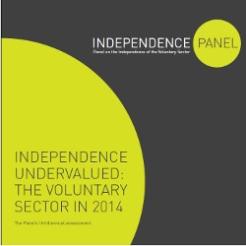The independence of the voluntary sector is “undervalued and under serious threat”, according to a report published today.
The report, entitled Independence Undervalued: the Voluntary Sector in 2014, is the third of four to be published by the Panel on the Independence of the Voluntary Sector.
The panel was established in June 2011 to ensure that independence is seen as a top priority by the voluntary sector. It is chaired by Sir Roger Singleton, former chief executive of Barnardo’s, and funded by the Baring Foundation.
It says that last year, the panel concluded the independence of the voluntary sector was under serious threat, but that “a year later, the challenge to that independence continues to grow”.
The report says that voluntary organisations do not place sufficient value on their independence and must fight harder to preserve it.
“Voluntary organisations themselves and those who regulate them must actively defend and exercise their independence,” the report says. “If independence is undervalued, it will be lost.”
The report says a “new settlement” between the sector and the state is required in order to safeguard the sector’s independence, and calls on the government to preserve the right of charities to bring judicial reviews, outlaw gagging clauses in contracts, restore a minimum 12-week period for consultations, and introduce legislation to outlaw state interference in the governance of charities.
It also says the Charity Commission must be encouraged and equipped to play a strategic role in “promoting and safeguarding the independence of charities”.
Government contracts leading to self-censorship
But it is “not optimistic” that these steps will be taken in 2014.
The panel says there has been an "increasing number of attacks on the policy and campaigning activities" in the past year, including measures in the lobbying bill to limit political activity, and proposals to restrict charities’ access to judicial review.
It says charities are increasingly being funded through contracts, and that this is causing them to self-censor because they are afraid of losing income.
In addition, it believes the commissioning process is undermining the uniqueness of sector bodies by forcing them into competition with the private sector. It says “poorly designed commissioning and procurement” could damage specific voluntary sector features such as local knowledge and a focus on underprivileged groups.
And it says that some charities are under too much state control. It singles out museums, which are registered as charities, but are regulated by the Department of Culture, Media and Sport and are considered to be non-departmental public bodies because the state provides funding and has the right to appoint board members.
The report also says that the Compact and the Charity Commission are not effective at safeguarding independence.
“The Compact – the high level agreement between the voluntary sector and government - is not being followed in many cases,” the report says. “The Cabinet Office has announced a stronger role in policing central government abuse but the panel think more is needed.
“The Charity Commission is struggling to carry out its full role in the face of diminished resources and is under pressure to focus on regulatory casework alone.
“That work is vital but the panel thinks the commission should be equipped to monitor and promote independence as well in order to meet its first statutory objective to increase public trust and confidence in charities.”









